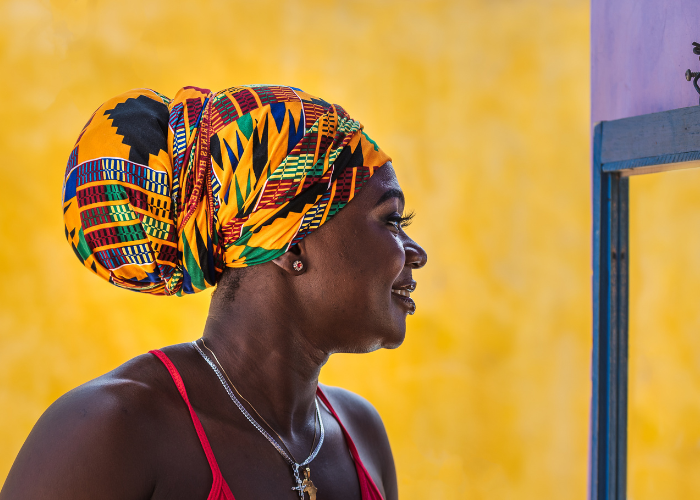West Africa is home to 449 million people, but there’s more to this geographical region than what the internet would have you believe.
Composed of 16 countries and 3 British Overseas Territories spanning around 8 million square kilometers, this area is marked by extraordinary landscapes, amazing languages, diverse cultures, and a relaxed atmosphere that makes you feel instantly at home.
Join us as we explore 5 interesting facts about West Africa that will make even the most averse expat look up how to move and relocate to this enchanting region.
1. Cultural Diversity
West Africa has remarkable cultural diversity, with hundreds—if not thousands—of ethnic groups and tribes. Each has its own language, dialects, customs, beliefs, practices, and way of life, manifested through food, dress, art, literature, and more.
Some have described the culture as primitive and unchanging, but this has more to do with the region’s prejudiced perception of being largely illiterate.
Several traditions around the continent have remained intact due to a lack of access to the area—even when infrastructure improved during colonization. It also has an abundance of folktales that vary across countries. These stories have entertained and communicated values, lessons, dreams, and experiences that have been passed down through generations by word of mouth.
If you want to hear them, you’re in luck as a significant part of the population (around 100 million) speaks English-based Creole. No doubt, this is a remnant of European colonizers.
If you’re a member of the African diaspora looking to reclaim your roots, you’ll fit right in with the right type of home from Jobomax.
2. Economic Hub
West Africa is enjoying a measure of economic growth, characterized by a rapidly expanding middle class.
Agriculture, the main driver for growth, is a source of livelihood for more than 60% of the sub-region’s active labor force and generates around $6 billion through exports.
Mobile internet adoption is also widespread and has gradually mobilized structural transformation. However, as of February 2022, only 27.7% of the population is using it compared to the global average of 51.2%.
Despite a few challenges, West Africa is poised for modest economic growth. According to the African Development Bank Group, all countries in the region are projected to grow by at least 4% in 2024.
3. Historical Legacy
Western Africa has a rich historical legacy, but learning about it can be a challenge due to the lack of comprehensive and chronological accounts of the continent’s history. Ultimately, oral traditions are probably the richest sources one can rely on.
Fortunately, it is now considered a field of academic specialization, offering possibilities for discovering fresh insights into the area’s pre- and post-colonial history.
There is evidence of early human settlement in West Africa and Sahara dating back to the Early and Middle Stone Age, though it isn’t as definitive as other regions. However, it’s estimated that Homo sapiens emerged in the continent around 300,000 years ago, making it one of the first regions in the world to have human inhabitants!
Meanwhile, trade between West Africa and the Mediterranean helped spread Islamic beliefs on the continent. After Christianity, Islam is the second most widespread religion.
4. Natural Wonders
From breathtaking coastlines and awe-inspiring waterways to rainforests that are a sanctuary to globally threatened, endangered, and endemic species, West Africa is filled with beautiful panoramas that will have you thirsting for more.
A prime example is Grand-Bassam, a historic town listed as a UNESCO World Heritage Site in 2012. The French colonial town boasts pristine beaches and tropical lagoons. You can stay at an exotic resort or a cozy rental space to relax amid the soothing sounds of nature.
While you’re on the Ivory Coast, don’t forget to visit Tai National Park. Aside from being a UNESCO World Heritage site, it’s also home to a rich variety of wildlife.
Throughout the region, you’ll find natural wonders to astound you. Ghana has stunning natural parks, quiet beaches, and the charming Lake Bosumtwi. In Nigeria, you’ll find the Obudu Plateau and Olumo Rock. Mali, on the other hand, is home to the renowned Niger River.
5. Vibrant Music and Arts Scene
From wrought iron sculptures at galleries and earth pigments in paintings to rich crafting traditions, West Africa inspires visitors with its immense artistry.
The area is most famous for its masks and sculptures but it has a lot to offer through art and elaborate textile designs.
Sadly, many of its artistic masterpieces have been plundered by colonizers. Countless artworks have been taken without the consent of West African countries and displayed in galleries and museums around the globe. Though there have been efforts to repatriate historic pieces, there is still a lot of work to be done.
Nonetheless, many notable artists have emerged in the region. Some of its most prominent painters include Gyakie, Black Sherif, Sidiki Diabaté, Malick Pathé Sow, Youssoupha Sidibe and Yacouba Sissoko.
Museums
You can find museums as diverse as the culture throughout the region. Nigeria is home to the Benin City National Museum, Ghana has the Pan African Heritage Museum while Dakar hosts the IFAN Museum of African Arts and the Museum of Black Civilisations.
Music
West Africa also has a magnificent musical heritage that focuses on rhythm rather than lyrics. It encompasses several aspects of the region’s culture, including dance traditions, folklore, religious ceremonies, and more.
With Ghana hosting the first West African Music and Arts Festival in Accra in 2024, you can experience the region’s creativity firsthand during the four-day festival in June. The event promises famous artists, engaging workshops, masterclasses, and inspiring art installations.
This place is responsible for birthing musical greats like Thione Seck, Youssou N’Dour, Baaba Maal, Fela Kuti, Ali Farka Touré, Amadou & Mariam, and Salif Keita.
Bonus: Many people are moving to live in West Africa!
West Africa remains a culturally rich home for about 8.4 million migrants. The number of expats could increase as more individuals look to settle in places with new opportunities and promising growth.
West African cities have burgeoning populations that are significantly comprised of young people. In large cities like Lagos, Dakar, and Accra, more than two-thirds of their residents are below 30 years old. Their ideals, preferences, and principles will continue to shape these urban centers.
If you love immersing yourself in the local culture and can’t seem to forget the warmth of West African hospitality, it may be time to consider settling down in this growing vibrant region. Jobomax Homes, the leading real estate developer in West Africa, can help you find your dream home in key cities.
Conclusion
Why live in West Africa? While the answer differs for everyone who moves here, its cultural diversity, economic activity, historical legacy, natural wonders, and artistry are beguiling reasons for most visitors-turned-residents.
With the Sahara Desert in the north, the Atlantic Ocean in the West, Lake Chad in the East, and the Gulf of Guinea in the South, nothing compares to this region’s natural beauty and richness.
If you’re looking to call West Africa home, Jobomax Homes has several prime locations you can choose from.

